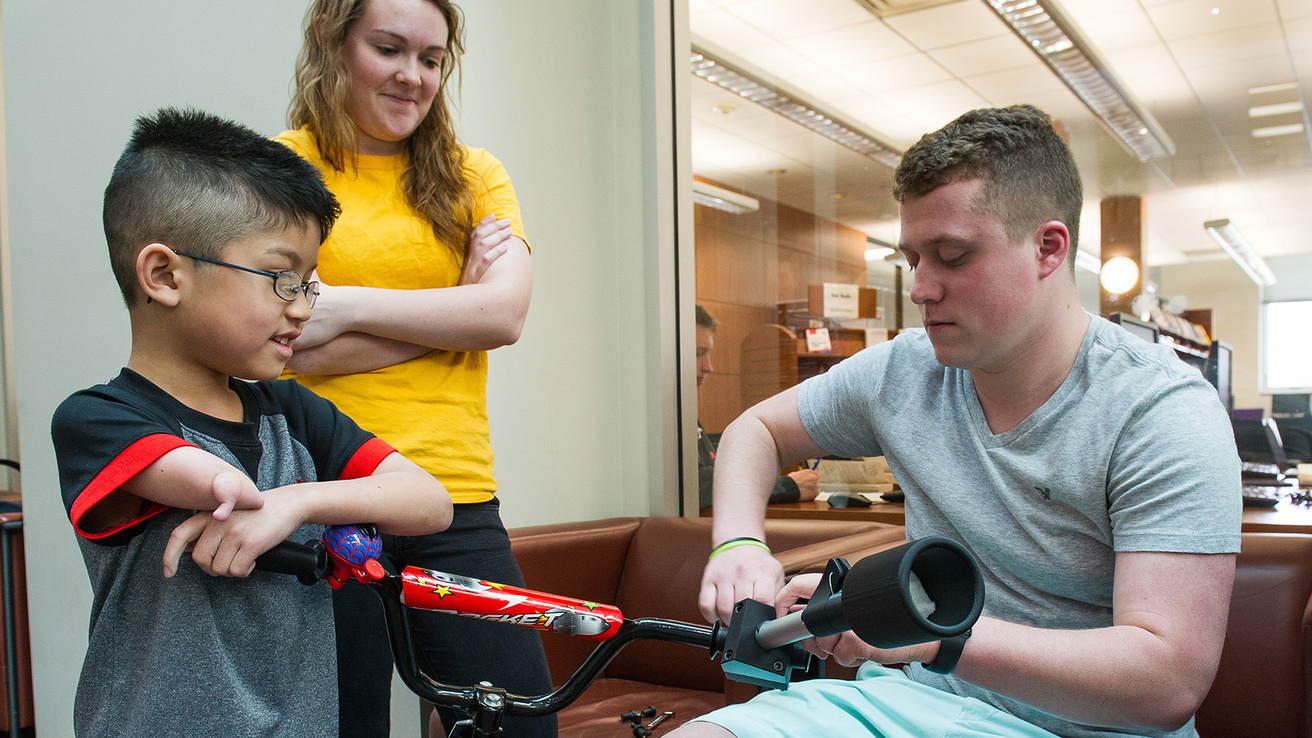The rewards are there for the taking — solving problems, making good money, helping people. Prepare to navigate the rigorous road to get there.
For students who are drawn to the idea of solving real medical problems with engineering tools — designing better prosthetics, advancing imaging technology, or even helping restore lost senses — getting a biomedical engineering degree can lead to a promising and impactful career.
Let’s look at the pros and cons of being a biomedical engineer, the lifestyle it can offer, and the salary you can expect to earn.
What is the life of a biomedical engineer?
There is no single answer to this because biomedical engineering is a diverse field.
To start with, biomedical engineering jobs can be found in countless professional environments, including hospitals and clinics, medical device companies, research institutions, and government and regulatory agencies.
“I feel like I have a lot more freedom and variability in my day-to-day than you’d find in many traditional R&D roles,” says Austin Caldwell, a research and development engineer at Boston Scientific in Minneapolis who got a BSE in biomedical engineering in 2022 from the University of Iowa. “There are days where I have to know everything about the biological healing processes, or the difference between canine and human and other preclinical models, and how we’re putting all that together. And then there are days where I need to know about the nuances of material properties and crystalline structure of nitinol. Every week, there is something different to learn about, to share, to explore. My role takes me all over the place, and I really like that.”
The field is also deeply collaborative. As a biomedical engineer, you might find yourself teaming up with doctors, biologists, chemists, and mechanical or electrical engineers.
Depending on the type of biomedical engineering you pursue, your day-to-day responsibilities might include tasks such as:
- Prototyping prosthetics or wearable monitors.
- Designing new surgical or imaging tools.
- Analyzing clinical trial data.
- Testing new materials for artificial organs.
- Ensuring devices meet safety and regulatory standards.
Many biomedical engineering roles are project-based, meaning no two weeks look quite the same. For example, you might spend one day programming a diagnostic device and the next interpreting MRI data.

What are the advantages of being a biomedical engineer?
Biomedical engineering is a purpose-driven career. You’re not just designing devices; you’re building solutions that can save and transform lives. You’re also contributing to society by, among other things, advancing medical care and creating cost-effective tools for underserved communities.
“I love making devices that directly help people. That is my passion,” says Andy Leopold, a University of Iowa biomedical engineering alum who co-founded Medical Murray, a contract development and manufacturing organization for minimally invasive medical devices and implants. “One very recent example: a device that treats narrowing in the aorta in infants. The existing standard treatment, prior to this device, was to place a stent and, after a period of time, open up the aorta, remove the old stent, and place a new stent year after year as the child grew. The new device accounts for the growth of the patient — there’s no need to replace.
“We received a fantastic letter from the mother of a patient who received this device; she wrote about how successful it’s been and included an X-ray image of her 6-month-old son with the device in place,” Leopold adds. “That’s exactly the kind of stuff that we get to do every day, making devices that help people.”
Biomedical engineers report above-average happiness with their jobs, often linked to the meaningful nature of their work. According to a study by CareerExplorer, biomedical engineering is in the top 40% of careers for career satisfaction.
“One reason students major in biomedical engineering is because they want to help people,” says Kim “Avrama” Blackwell, professor and departmental executive officer of biomedical engineering at the University of Iowa. “Biomedical engineering grads do this in many ways: by designing a new medical treatment, developing medical equipment that improves mobility, or designing a new imaging machine that leads to better diagnoses. Biomedical engineering is definitely a helping profession.”

Furthermore, biomedical engineers are increasingly in demand, and the trend is expected to continue. The U.S. Bureau of Labor Statistics projects a 5% growth in employment for biomedical engineers between 2024 and 2034, faster than the average for all occupations. The bureau also predicts about 1,300 openings for biomedical engineering jobs each year over the next decade as employers will need to replace workers who transfer to different occupations or exit the labor force (such as to retire).
Getting a degree in biomedical engineering also offers flexibility. If you decide at some point that you don’t want to work in biomedical engineering, you’ll find that your technical, critical thinking, and problem-solving skills will serve you well in other fields, including public health, medicine, business, and other types of engineering.
What are the disadvantages of being a biomedical engineer?
No career is perfect.
Like any other field, biomedical engineering has its potential challenges. (Don't equate “challenges” with “negatives.”)
- The degree path is rigorous: The requirements to get a biomedical engineering degree mean you can expect to juggle courses such as biology, calculus, circuits, and mechanics.
- It’s interdisciplinary — which means no shortcuts: You’ll need expertise in biology, medicine, and engineering.
- It can be a competitive job market without experience: Job entry for biomedical engineering can be slower without internships. Employers often look for real-world project experience.
- It’s a rapidly evolving field: Continuous learning and adaptation to new technologies and regulations is required of any biomedical engineer.
- An advanced degree may be required: Some biomedical engineering roles, such as in research and development or academia, may mean you’ll need to go back to school to get a master’s degree or even a PhD.
When choosing a college or university for biomedical engineering, look at the resources it offers to help students overcome some of these challenges, including tutoring, finding internships, participating in research, or writing résumés and cover letters.
For example, University of Iowa College of Engineering students can tap into resources such as Engineering Tutoring, Engineering Career Services, Undergraduate Research Opportunities, and the Hanson Center for Communication, among others. They also benefit from a strong partnership between the engineering college and the University of Iowa Carver College of Medicine and University of Iowa Health Care.
Do biomedical engineers make good money?
Biomedical engineering is generally a well-paying field. Salaries vary based on experience, specialization, and location, but biomedical engineers often enjoy strong job prospects and competitive pay.
According to the U.S. Bureau of Labor Statistics, the median annual salary for biomedical engineers in the U.S. was $106,950 in 2024. This is significantly higher than the median salary for all U.S. occupations, which hovers around $49,500.
Below you’ll find salary ranges for biomedical engineers throughout the United States. The median annual salary is there, but we also want to show what an income looks like at various percentiles. The lower point gives you an idea of where entry-level jobs might land, while the upper percentile demonstrates what experience or an advanced biomedical engineering degree might help you earn.
| Geography | 10th | Median | 90th |
|---|---|---|---|
| U.S. | $71,860 | $106,950 | $165,160 |
| California | $83,990 | $125,700 | $173,630 |
| Massachusetts | $80,700 | $107,720 | $163,430 |
| Minnesota | $83,440 | $124,760 | $184,510 |
| Ohio | $79,140 | $117,960 | $165,570 |
| Texas | $54,840 | $97,160 | $151,330 |
| Washington | $64,510 | $125,010 | $182,250 |
Source: U.S. Bureau of Labor Statistics Occupational Employment and Wage Statistics, published May 2024.
If you are interested in numbers from specific states, visit the U.S. Bureau of Labor Statistics website and select the state you’re interested in.
Cost of living also matters. If you live in Iowa City, a $91,760 salary (the median salary of all biomedical engineers in the state of Iowa, per the U.S. Bureau of Labor Statistics) will offer you the same standard of living as $121,863 in San Francisco. It would be wise to plug numbers into a cost-of-living calculator to see how far a dollar in one region might stretch (or shrink) in a different ZIP code. There are many calculator options on the web; this one from SmartAsset has a broad selection of U.S. cities available for selection.
FAQ: Is biomedical engineering a good career?
What kinds of jobs can you get with a biomedical engineering degree?
Biomedical engineering graduates work in a wide range of roles beyond the obvious biomedical engineer. They often work as medical device designers, quality engineers, clinical engineers, research scientists, and product development specialists. Many find opportunities in health care technology companies, research labs, government agencies, and regulatory or consulting roles.
What types of biomedical engineering specializations are available?
Biomedical engineering offers several specialization areas, including biomaterials, biomechanics, medical imaging, neural engineering, and bioinstrumentation. Choosing a focus allows students to align their degree with interests in areas such as prosthetics, medical devices, diagnostics, or health technology innovation.
Is graduate school necessary for biomedical engineering careers?
Graduate school is not required for all biomedical engineering jobs, but it can open doors to advanced research, leadership roles, and higher earning potential. A master’s degree may be useful for specialization, while a PhD is typically pursued by those interested in academic or high-level research careers.
Can biomedical engineering prepare you for medical school?
Biomedical engineering is a common and strong pathway to medical school. The curriculum covers many required medical school prerequisites while also developing problem-solving and analytical skills valued in medicine and health care innovation.
How long does it take to earn a biomedical engineering degree?
A bachelor’s degree in biomedical engineering typically takes four years to complete. Master’s programs often require one to two additional years, while PhD programs vary depending on research focus and dissertation requirements.
Is it hard to find a job with a biomedical engineering degree?
Biomedical engineering graduates generally have strong job prospects due to their interdisciplinary skill set. The combination of engineering, biology, and technology prepares students for roles across health care, research, manufacturing, and emerging medical technology fields.
Related content

Biomedical engineering degree jobs: Diverse skills fit a wide range of career paths

How much money does a biomedical engineer make?

